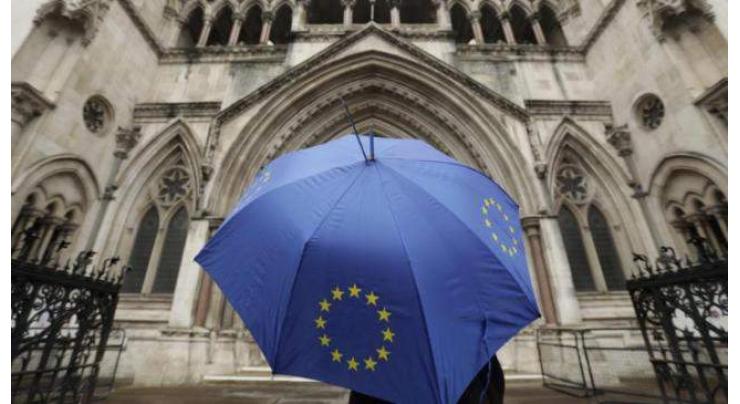
High Court To Rule Thursday On Brexit Challenge
Fahad Shabbir (@FahadShabbir) Published November 02, 2016 | 09:55 PM

LONDON, Nov 2, (APP - UrduPoint / Pakistan Point News - 02nd Nov, 2016 ) - The High Court will decide Thursday whether the British government has the right to trigger the process for leaving the EU without the prior authorisation of parliament, in a ruling that could delay Brexit.
The verdict by three senior judges will be closely watched around Europe and by the financial markets as it could derail Prime Minister Theresa May's plans and affect her negotiating strategy. Following the June referendum vote for Britain to leave the European Union, May has promised to start formal exit talks by the end of March.
She claims she has the right to use "historic prerogative powers" -- a type of executive privilege -- to trigger notification of Article 50 of the EU's Lisbon Treaty, which would spark two years of negotiations on Britain's departure from the bloc.
The government is allowing parliament to scrutinise the process and a vote on the final deal is likely. But those behind the legal challenge -- including an investment fund manager, a hairdresser and an expatriate living in France -- argue that Article 50 cannot be triggered without a decision by parliament.
They claim leaving the EU without such a move would remove statutory rights enshrined under the European Communities Act 1972, which made EU law part of UK law. May has accused those supporting the challenge of trying to frustrate the Brexit process, saying: "They're trying to kill it by delaying it." The judges will deliver their verdict in London at 10:00am (1000 GMT), the court announced Wednesday.
The three judges deciding on the case are Lord Chief Justice John Thomas, the head of the English judiciary and president of the courts; Master of the Rolls Terence Etherton, the second most senior judge; and Philip Sales, an appeal court judge.
On Friday, Northern Ireland's High Court rejected a legal challenge to Brexit, the first judicial ruling on the issue in the UK. The challenge rested on assumptions spiralling from the Good Friday Agreement peace accords that Northern Ireland's constitutional arrangements could only be changed with the consent of its residents.
Related Topics
Recent Stories

ICC Womens T20 World Cup Qualifier, Match 2: Ireland Women open with Comfortable ..

Robinson, bowlers help New Zealand go 2-1 up against Pakistan

Shahzeb Chachar to hold khuli kachehri on April 26

Heatwave amid Israel's aggression in Gaza brings new misery, disease risk

Tourism must change, mayor says as Venice launches entry fee

Court adjourns Judicial Complex attack case till May 17

Nasreen Noori’s book ‘Popatan Jahra Khwab’ launched

Wafaqi Mohtasib inspection team visits Excise and taxation office

AJLAC announces 5th Conference titled ‘People’s Mandate: Safeguarding Civil ..

Pak-US officials engage to enhance trade, investment ties

IBCC to promote educational excellence, expand regional presence

Pakistani 'Blue Helmets' serving UN Peacekeeping Mission in DR Congo set to leav ..
More Stories From World
-
Bangladesh children sweat at home as heatwave shuts schools
26 minutes ago -
Pakistani 'Blue Helmets' serving UN Peacekeeping Mission in DR Congo set to leave after 20 years of ..
46 minutes ago -
Golf: PGA Zurich Classic of New Orleans scores
56 minutes ago -
Slot 'confident' of Liverpool job as 'negotiations' take place
7 hours ago -
Google parent Alphabet's Q1 profits beat estimates: company
7 hours ago -
WADA asks 'independent prosecutor' to examine Chinese swimmers case
7 hours ago
-
New York court overturns Harvey Weinstein sex crime conviction
7 hours ago -
Bagnaia and Spanish rivals chase victory at Jerez
9 hours ago -
Russian, Ukrainian strikes kill at least 10 in frontline regions
9 hours ago -

Heatwave amid Israel's aggression in Gaza brings new misery, disease risk
9 hours ago -

Tourism must change, mayor says as Venice launches entry fee
9 hours ago -

Pakistani 'Blue Helmets' serving UN Peacekeeping Mission in DR Congo set to leave after 20 years of ..
10 hours ago


